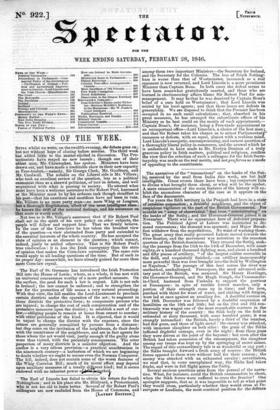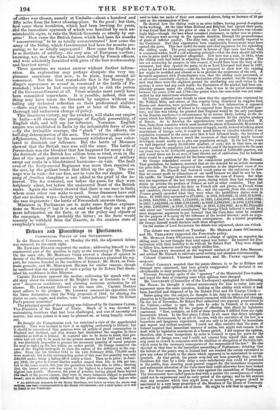The narratives of the "transactions" on the banks of the
Sut- lej, received by the mail from India this week, are but half intelligible. Great events there have been ; but conjecture fails to divine what brought them about, or what will be the upshot. A mere enumeration of the main features of the history will ex- hibit the anomalous character of the case as it appears on the face of the documents.
For years the Sikh territory in the Punjaub had been in a state of intestine commotion; a doubtful neighbour' and the object of suspicious vigilance on the part of the British Government. For months an "army of observation" had been "concentrating" on the banks of the Sutlej ; and the Governor-General joined it in November. There was no appearance here of deficient prepara- tion. The Political Agent at Lahore was instructed to de- mand concessions ; the demand was spurned ; and Major Broad- foot withdrew from the negotiations. No want of warning there. The great army that really governed Lahore moved towards the river frontier, and the movement was notorious to the remotest quarters of the British dominions. They crossed the Sutlej, mak- ing the passage from the 11th to the 14th of December, with some eightyor a hundred thousand fighting men, and about a hundred and fifty pieces of artillery, "of the largest calibre moveable in the fiela, and exquisitely finished,—an artillery immeasurably more powerful than was ever brought into the field by Wellington or Napoleon." The passage of this host across the river -was unchecked, unchallenged. Ferozepore, the most advanced mili- tary post of the British, was menaced. Sir Henry Hardinge, the Governor-General, and Sir Hugh Gough, the Commander- in-Chief, hastened from Umballa to support the garrison at Ferozepore : in spite of terrible forced marches, only a portion of their strength came up in time ; and the men, parched with thirst for want of water, and sinking with fatigue, were led at once against an assailing foe. A doubtful success on the 18th December was followed by a doubtful suspension of hostilities on the 19th and 20th; but on the 21st and 22d con- tinuously was waged one of the most remarkable contests in the military history of the country : the Sikh body on the field is estimated at sixty thousand, with some hundred guns ; it was strongly intrenched : the British, barely a third of the number, had few guns, and those of light metal : the enemy was attacked, with immense slaughter on both sides : the guns of the Sikhs inflicted frightful carnage, even in the night : from these guns they were driven at the point of the bayonet : but even after the British had taken possession of the encampment, the slaughter among our troops was kept up by the springing of secret mines. The sequel of this extraordinary tale is as wonderful as any part : the Sikhs brought forward a fresh army of reserve : the British forces opposed to them were without ball for their cannon • the enemy was attacked with an exhausted cavalry: nevertheless, we read that, in some unexplained way, the Sikhs -had taken fright, and were in full flight across the Sutlej. Several anxious questions arise from the perusal of the narra- tive. What, for instance, could the British commanders be about, when the Sikh forces were suffered to cross the frontier? One apologist suggests, that as it was impossible to tell at what point they would cross, particularly whether they would cross at Pe- rozepore or Loodiana, the most centrical position for the defence
of either was chosen namely at Umballa—about a hundred and fifty miles from the lower crossing-place. So far good ; but then, how came these hostilities, which had been brewing for years, _aid the immediate approach of which was heralded by such un-
mistakeable signs, to take the British Generals so utterly by sur- prise? How came the British forces, which had been for months "concentrating," to be so totally unconcentrated how came the army of the Sutlej, which Government had been for months pre- paring, to be so totally unprepared ? How came the English to be so destitute of artillery—the very arm of European warfare ; knowing, too, that the Sikhs had been drilled by French officers, and were admirably furnished with guns of the best workmanship and heaviest metal?
These questions we cannot answer without further inform- ation. An explanation may perhaps dissipate the very un- pleasant suspicions that now, to be plain, hang around all concerned. Not the least remarkable fact is Sir Henry Har- dinge's appearance as second in command at the battle of Fe- rozeshah; where he had scarcely any right to risk the person of the Governor-General at all. Gross mistake must surely have been committed somewhere. It is possible, indeed, that one thing may have taken the Generals by surprise without en- tailing any technical reflection on their professional abilities —there may have been, on the part at least of the Sikhs, a thorough and unforeseen change of policy. This disastrous victory, say the croakers, will shake our empire in India—will destroy the prestige of English generalship, of English skill, and will sap our influence. Nonsense. English empire was established in India by the indomitable force of arms —by the invincible courage, the " pluck " of the officers, the bull-dog determination of the men. The resultless aggression on Affghanistan, followed by the necessary withdrawal, was calcu- lated to diminish our Influence. But the battle of Meeanee showed that the British race was still the same. The battle of Ferozeshah was the bloodiest that has happened for many a day ; the fortitude of the British has seldom been so tried, even in the face of the most potent enemies : the iron tempest of artillery swept our ranks in a bloodstained hurricane—in vain. The fault even of the Sixty-second Regiment was more than repaired on the spot, by the gallant bands that filled up the gap. The car- nage was in vain—for our foes, not in vain for our empire. The pang of fruitless slaughter is not added to the grief of the be- reaved. The foe retreated, not before the guns, for they were helplessly silent, but before the undaunted front of the British ranks. Again the soldiery showed that there is one race in India whom none other can make to quail. Some dreamers have said that our modern ways—factory systems, and so on—have made the race degenerate : the battle of Ferozeshah answers them. Ministers in Parliament are to make some further explana- tions on Monday ;* but it is not said whether they are to give more information on the facts, or on the policy and objects of the campaign. Most probably the latter; as the facts would scarcely be withheld from the Gazette, in the anxious state of everybody's mind.



























